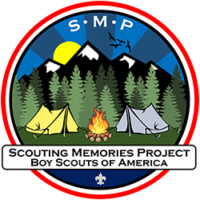
Fig. 1: CitNat-H4-Front
- Embroidery: Cotton thread, dull sheen
- Border: Silver merrowed

Fig. 2: CitNat-H4-Reverse
- Back: Molded plastic
Item Name: Citizenship in the Nation 1978 - 1990
Item ID: CitNat-H4
Collector Rating: 1
Requirements July 1976 until January 1984/strong>
1. Read the Declaration of Independence. Tell the meaning of the "self-evident truths".
2. Read the Constitution of the United States of America with its amendments.
(a) Explain its purpose as set forth in the Preamble.
(b) Chart the organization of our government into three branches as outlined in Articles 1, 2, and 3.
(c) Explain the checks and balances. Give the reason for them.
(d) Tell how the Constitution may be amended.
3. Show newspaper or magazine stories which show how three of the rights in our Bill or Rights have been protected in our country.
4. Talk over the main differences between a republic and a democracy. Tell how these differences have been adapted to our form of government.
5. Take part in a group discussion of an important national problem of the day. Report on both sides that were presented. Tell what you learned from it.
6. Do ONE of the following:
(a) Visit the National Capitol or a Federal project which serves your town or region; or a place associated with a person or event which figured in the history of our country. Get information for your visit. Report on your trip, explaining why the things you saw are important.
(b) Correspond with someone about your age who lives in another part of the United States. Exchange things such as ideas, pictures, and descriptive material. From this exchange, compare the two places. Show how they are alike and different.
7. Tell the names of the Senators from your state and your Representative in Congress. Tell how you should address a letter to them at their Washington offices. Write to one of them, giving your views on a local or national issue of your choice. Show a copy of your letter to your counselor.
8. Tell what branch or department of the government is responsible for 10 of the following: appropriations for government expenses, atomic energy, child welfare, education, energy conservation, fish and wildlife, flood control, foreign policy, investigation of violating of federal laws, judgment on federal violations, minting of money, national forests, national parks, public housing, soil conservation, supreme command of our Armed Forces, water and air pollution, and weather forecasting.
9. Do the following:
(a) Outline five ways in which the Federal Government serves you, your family, and your town directly. Also, talk with your parents (or guardians) and counselor about the ways in which Federal income, Social Security, excise and other taxes, as well as import duties, affect the cost of living.
(b) Explain what is meant by "resource management".
(c) List five Federal conservation agencies. List the main ones in your state. List five private conservation groups. Tell what they do. Describe three successful conservation projects in your area including one in energy conservation.
10. Tell what a citizen from another country must do to become a United States citizen.
Requirements January 1984 until January 2005
1. After reading, discuss with your counselor the following documents:
(a) Declaration of Independence
(b) Preamble to the Constitution
(c) Constitution
(d) Bill of Rights
(e) Amendments to the Constitution
2. Name the three branches of government and explain their functions. Explain the checks and balances on each branch of government.
3. Outline the relationships between state and federal governments.
4. Do ONE of the following:
(a) Visit the National Capitol.
(b) Visit your state capitol.
(c) Tour a federal installation.
Explain your experiences to your counselor.
5. Name your two senators and the congressman from your congressional district. Write a letter to one of these elected officials on a national issue sharing your view with him or her. Show your letter and any response to your counselor.
6. What are five important functions of your national government? Explain how these functions affect your family and local community.
7. Discuss the main ways by which our federal government is financed.


